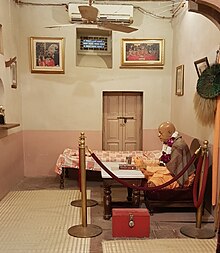Abhay Charanaravinda Bhaktivedanta Swami, also known as Prabhupada, was a Gaudiya Vaishnava guru from India who founded the International Society for Krishna Consciousness (ISKCON), also known as the "Hare Krishna movement". Prabhupada was born in Calcutta in 1896 to a family of devout Vaishnavas. He studied at the Scottish Church College but refused his degree in response to Gandhi's call to challenge British rule. He later became a follower of Bhaktisiddhanta Sarasvati and, after his retirement, left his family to become a sannyasi and write commentaries on Vaishnava scriptures.
As a travelling Vaishnava monk, Prabhupada became an influential communicator of Gaudiya Vaishnavite theology across India and the Western world through his leadership of ISKCON, which he founded in 1966. He was known for his charismatic leadership and was successful in acquiring followers in many Western countries and India. Despite being well regarded by a number of American religious scholars, he was also criticized by anti-cult groups.
After his death in 1977, ISKCON continued to grow and spread his teachings. Prabhupada's guru, Bhaktisiddhanta Sarasvati Thakura, had always encouraged him to publish books, referring to the need for the literary presentation of the Vaishnava culture. Prabhupada lived at the medieval Radha-Damodar mandir in Vrindavan, where he began his commentary and translation work of the Sanskrit work Bhagavata Purana. He also oversaw the construction of temples in Mumbai, Mayapur, and Vrindavan and started a chain of ISKCON schools.

Bhaktivedanta Swami founded the International Society for Krishna Consciousness (ISKCON) in New York City in 1966. He travelled with his disciples throughout America, spreading the movement through street chanting, book distribution, and public speeches. He established temples and communities in other countries and by the time of his death in 1977, ISKCON had become an internationally known expression of Vaishnavism.
Bhaktivedanta Swami believed that the name of God was more important than the specific religion one followed. He believed that following the Vedic scriptures and chanting the name of God was the main point of any religion. He also acknowledged that people may change their faiths, but dharma, the natural occupation or connection with God, is permanent and cannot be changed.
Bhaktivedanta Swami's approach to modern knowledge was similar to that of sectarian Orthodox Judaism. He encouraged the acquisition of skills and technical knowledge but rejected modern values. He believed that offering the result of one's engagement to Krishna was the way to become Krishna conscious.
He considered sexuality and spirituality as conflicting opposites, similar to many traditional religions. He believed that by following the teachings of Chaitanya Mahaprabhu and practicing bhakti yoga, one could achieve divine love and become Krishna conscious.
